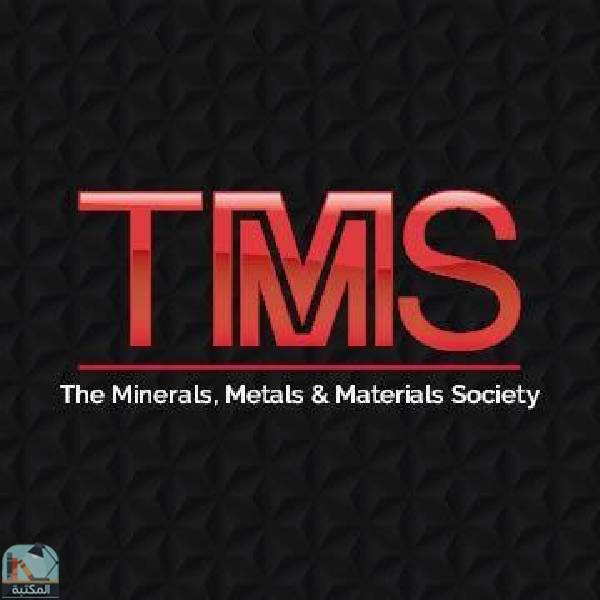📘 قراءة كتاب Magnesium Technology 2012: Atoms‐to‐Grains Corrosion Modeling for Magnesium Alloys أونلاين

The Magnesium Technology Symposium, which takes place every year at the TMS Annual Meeting & Exhibition, is one of the largest yearly gatherings of magnesium specialists in the world.

تكنولوجيا المغنيسيوم والألمنيوم المؤتمر الوطني العراقي
سبائك المغنيسيوم والتكنولوجيا
تكنولوجيا المغنيسيوم وسبائكه وتطبيقاتها
Doping
Abstract
Development of new Mg-alloys needs greater efforts in systematic
evaluation of corrosion protection methods under service
environments. A deeper understanding of microscale and
nanoscale metallurgy is needed to slow down corrosion. Results
from our multiscale modeling effort will be presented to
demonstrate the power of first-principle theories in predicting the
composition-dependent kinetics of corrosion reactions. Our recent
results show that the corrosion prevention properties of Mg-alloys
can be significantly enhanced by doping rare-earth elements such
as Cerium that protects the oxide layer from rapid hydrolysis.
Furthermore, we are developing kinetic Monte Carlo and finite-
element analysis (FEA) based models to extend the predictions
from the atomic length scales to nano- and microscale models that
will include grains and alloy microstructure. The potential for
incorporating mechanical and corrosion performance in
المغنيسيوم وسبائكه تكنولوجيا وتطبيقات pdf
التكنولوجيا والمغنيسيوم
magnesium technology 2012
technology magnesium and aluminum inc
magnesium alloys and technology
magnesium - alloys and technology pdf
magnesium technology metallurgy design data applications
magnesium and its alloys technology and applications
magnesium and its alloys technology and applications pdf
The Magnesium Technology Symposium, which takes place every year at the TMS Annual Meeting & Exhibition, is one of the largest yearly gatherings of magnesium specialists in the world. Papers are presented in all aspects of the field, ranging from primary production to applications to recycling. Moreover, papers explore everything from basic research findings to industrialization. Magnesium Technology 2011 covers a broad spectrum of current topics, including alloys and their properties; cast products and processing; wrought products and processing; forming, joining, and machining; corrosion and surface finishing; ecology; and structural applications. In addition, you'll find coverage of new and emerging applications in such areas as biomedicine and hydrogen storage.
تعد ندوة تكنولوجيا المغنيسيوم ، التي تقام كل عام في الاجتماع والمعرض السنوي TMS ، واحدة من أكبر التجمعات السنوية لمتخصصي المغنيسيوم في العالم. يتم تقديم الأوراق في جميع جوانب المجال ، بدءًا من الإنتاج الأولي إلى التطبيقات إلى إعادة التدوير. علاوة على ذلك ، تستكشف الأوراق كل شيء من نتائج الأبحاث الأساسية إلى التصنيع. يغطي Magnesium Technology 2011 مجموعة واسعة من الموضوعات الحالية ، بما في ذلك السبائك وخصائصها ؛ منتجات الصب والمعالجة ؛ منتجات مشغولة ومعالجة؛ التشكيل والانضمام والتشغيل الآلي ؛ التآكل وتشطيب السطح ؛ علم البيئة. والتطبيقات الهيكلية. بالإضافة إلى ذلك ، ستجد تغطية للتطبيقات الجديدة والناشئة في مجالات مثل الطب الحيوي وتخزين الهيدروجين.
Magnesium is a chemical element with the symbol Mg and atomic number 12. It is a shiny gray solid which bears a close physical resemblance to the other five elements in the second column (group 2, or alkaline earth metals) of the periodic table: all group 2 elements have the same electron configuration in the outer electron shell and a similar crystal structure.
المغنيسيوم هو عنصر كيميائي يحمل الرمز Mg والرقم الذري 12. وهو مادة صلبة رمادية لامعة تحمل تشابهًا ماديًا وثيقًا مع العناصر الخمسة الأخرى في العمود الثاني (المجموعة 2 ، أو معادن الأرض القلوية) من الجدول الدوري: الكل عناصر المجموعة 2 لها نفس التكوين الإلكتروني في غلاف الإلكترون الخارجي وبنية بلورية مماثلة.
Magnesium is the ninth most abundant element in the universe. It is produced in large, aging stars from the sequential addition of three helium nuclei to a carbon nucleus. When such stars explode as supernovas, much of the magnesium is expelled into the interstellar medium where it may recycle into new star systems. Magnesium is the eighth most abundant element in the Earth's crust and the fourth most common element in the Earth (after iron, oxygen and silicon), making up 13% of the planet's mass and a large fraction of the planet's mantle. It is the third most abundant element dissolved in seawater, after sodium and chlorine.
المغنيسيوم هو تاسع أكثر العناصر وفرة في الكون. يتم إنتاجه في النجوم الكبيرة والشيخوخة من الإضافة المتسلسلة لثلاث نوى هيليوم إلى نواة الكربون. عندما تنفجر مثل هذه النجوم على شكل مستعرات عظمى ، يتم طرد الكثير من المغنيسيوم إلى الوسط بين النجوم حيث يمكن إعادة تدويره إلى أنظمة نجمية جديدة. يعد المغنيسيوم ثامن أكثر العناصر وفرة في القشرة الأرضية ورابع أكثر العناصر شيوعًا في الأرض (بعد الحديد والأكسجين والسيليكون) ، ويشكل 13٪ من كتلة الكوكب وجزءًا كبيرًا من غطاء الكوكب. وهو ثالث أكثر العناصر المذابة وفرة في مياه البحر ، بعد الصوديوم والكلور.
سنة النشر : 2012م / 1433هـ .
حجم الكتاب عند التحميل : 1 ميجا بايت .
نوع الكتاب : pdf.
عداد القراءة:
اذا اعجبك الكتاب فضلاً اضغط على أعجبني و يمكنك تحميله من هنا:

شكرًا لمساهمتكم
شكراً لمساهمتكم معنا في الإرتقاء بمستوى المكتبة ، يمكنكم االتبليغ عن اخطاء او سوء اختيار للكتب وتصنيفها ومحتواها ، أو كتاب يُمنع نشره ، او محمي بحقوق طبع ونشر ، فضلاً قم بالتبليغ عن الكتاب المُخالف:
 قبل تحميل الكتاب ..
قبل تحميل الكتاب ..
يجب ان يتوفر لديكم برنامج تشغيل وقراءة ملفات pdf
يمكن تحميلة من هنا 'http://get.adobe.com/reader/'
جمعية المعادن والمواد
 ❰ ناشرين لمجموعة من المؤلفات أبرزها ❞ Settling Phenomena in Casting Furnaces: A Fundamental and Experimental Investigation ❝ ❞ Light metals 2012: Effect of Silicon Particles on the Tensile Properties of Heat Resistant Al‐Si‐Cu‐Ni‐Mg Alloy Pertaining to Different Tensile Temperature ❝ ❞ Light metals 2012: The Evolution of Mechanical Properties and Microstructure in Early Stages of Natural Ageing on 2024 Plates ❝ ❞ Light Metals 2012: The Influence of Solution Treatment on the High‐Temperàture Strength of Al‐Si Foundry Alloys with Ni ❝ ❞ Light Metals 2012: A Specific Critical Analysis on the Life Time of Alumina Calciners Refractories ❝ ❞ LIght Metals 2011: Recent Developments in Anode Baking Furnace Design ❝ ❞ Light metals 2012: Refinement of Fe‐Intermetallic Compounds by Caliber Rolling Process of Al‐Mg‐Si‐Fe Alloys ❝ ❞ Magnesium Technology 2011: Cryogenic Burnishing of AZ31B Mg Alloy for Enhanced Corrosion Resistance ❝ ❞ light metals 2011: Study of Early Stage Interaction of Oxygen with Al; Methods, Challenges and Difficulties ❝ ❞ Light Metals 2012: Tests with New Flocculant for Red Mud Decanting in Alunorte ❝ ومن أبرز المؤلفين : ❞ جون جراندفيلد ❝ ❞ كارلوس إي سواريز ❝ ❞ مارجريت هايلاند ❝ ❞ ستيفن جيه ليندسي ❝ ❞ باري سادلر ❝ ❞ سوفين نايجل ماثودهو ❝ ❞ جيوف بيرن ❝ ❞ آلان طمست ❝ ❞ دون دونالدسون ❝ ❞ ويم هـ. سيليكنز ❝ ❞ الهاني بوحبيلة ❝ ❞ أندريه لامارانتي ميسكيتا ❝ ❞ دانيال ريتشارد ❝ ❞ ماتياس هاغن ❝ ❞ رويجي تشاو ❝ ❞ آرني هيلك ❝ ❞ نوربرت هورت ❝ ❞ نزمول الهدى ❝ ❞ دنغ شيانغ ❝ ❞ جريس جوناسيجارام ❝ ❞ لوكاس ديون ❝ ❞ هيكو جيرتنر ❝ ❞ كايرون ف. لالوند ❝ ❞ جويوا وانغ ❝ ❞ فابيو إم سواريس ❝ ❞ هوغو فورتين ❝ ❞ بيل بول ❝ ❞ ه. ديفاديجا ❝ ❞ جون هيرن ❝ ❞ ب. الهريكي ❝ ❞ د. مولينار ❝ ❞ يي تشيان ❝ ❞ علي رضا حكمت اردكان ❝ ❞ ناتالي مينيه ❝ ❞ أ. سوروس ❝ ❞ بجارتي أويا ❝ ❞ مايكل نيت ❝ ❞ ابراهيم جدي ❝ ❱.المزيد.. كتب جمعية المعادن والمواد
❰ ناشرين لمجموعة من المؤلفات أبرزها ❞ Settling Phenomena in Casting Furnaces: A Fundamental and Experimental Investigation ❝ ❞ Light metals 2012: Effect of Silicon Particles on the Tensile Properties of Heat Resistant Al‐Si‐Cu‐Ni‐Mg Alloy Pertaining to Different Tensile Temperature ❝ ❞ Light metals 2012: The Evolution of Mechanical Properties and Microstructure in Early Stages of Natural Ageing on 2024 Plates ❝ ❞ Light Metals 2012: The Influence of Solution Treatment on the High‐Temperàture Strength of Al‐Si Foundry Alloys with Ni ❝ ❞ Light Metals 2012: A Specific Critical Analysis on the Life Time of Alumina Calciners Refractories ❝ ❞ LIght Metals 2011: Recent Developments in Anode Baking Furnace Design ❝ ❞ Light metals 2012: Refinement of Fe‐Intermetallic Compounds by Caliber Rolling Process of Al‐Mg‐Si‐Fe Alloys ❝ ❞ Magnesium Technology 2011: Cryogenic Burnishing of AZ31B Mg Alloy for Enhanced Corrosion Resistance ❝ ❞ light metals 2011: Study of Early Stage Interaction of Oxygen with Al; Methods, Challenges and Difficulties ❝ ❞ Light Metals 2012: Tests with New Flocculant for Red Mud Decanting in Alunorte ❝ ومن أبرز المؤلفين : ❞ جون جراندفيلد ❝ ❞ كارلوس إي سواريز ❝ ❞ مارجريت هايلاند ❝ ❞ ستيفن جيه ليندسي ❝ ❞ باري سادلر ❝ ❞ سوفين نايجل ماثودهو ❝ ❞ جيوف بيرن ❝ ❞ آلان طمست ❝ ❞ دون دونالدسون ❝ ❞ ويم هـ. سيليكنز ❝ ❞ الهاني بوحبيلة ❝ ❞ أندريه لامارانتي ميسكيتا ❝ ❞ دانيال ريتشارد ❝ ❞ ماتياس هاغن ❝ ❞ رويجي تشاو ❝ ❞ آرني هيلك ❝ ❞ نوربرت هورت ❝ ❞ نزمول الهدى ❝ ❞ دنغ شيانغ ❝ ❞ جريس جوناسيجارام ❝ ❞ لوكاس ديون ❝ ❞ هيكو جيرتنر ❝ ❞ كايرون ف. لالوند ❝ ❞ جويوا وانغ ❝ ❞ فابيو إم سواريس ❝ ❞ هوغو فورتين ❝ ❞ بيل بول ❝ ❞ ه. ديفاديجا ❝ ❞ جون هيرن ❝ ❞ ب. الهريكي ❝ ❞ د. مولينار ❝ ❞ يي تشيان ❝ ❞ علي رضا حكمت اردكان ❝ ❞ ناتالي مينيه ❝ ❞ أ. سوروس ❝ ❞ بجارتي أويا ❝ ❞ مايكل نيت ❝ ❞ ابراهيم جدي ❝ ❱.المزيد.. كتب جمعية المعادن والمواد 
 منصّة المكتبة
منصّة المكتبة